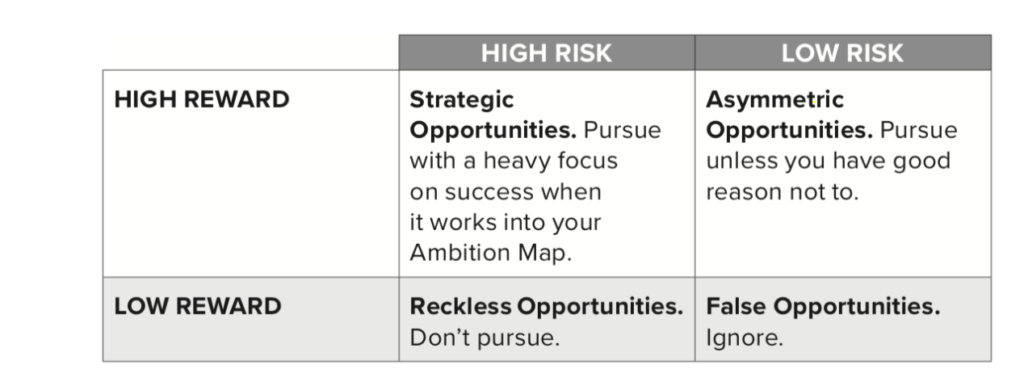One of the best sets of mental models you can build out is how to think about risk. Should you interview for a new job? Should you quit your job? Should you move across the country? Should you cash out your investments and go all in on your business.
Without some tools for thinking about these questions, most people end up making them based on emotional reactions and the input of people around them. For me, I’ve relied on a few to help me process decisions with apparent risk. I write about these in chapter 5 of my book with respect to deciding whether or not to pursue a new career opportunity.
Opportunities don’t fall into a single category.
Some opportunities are low-risk, low-reward. This is most stuff in life, so they really aren’t “opportunities” per se. They’re false opportunities. You get a cup of coffee at an espresso shop in Montreal. You could go interview for a job at the coffeeshop. It won’t really risk you much. But unless you want to be a barista, it’s going to waste your time. Ignore this opportunity.
Other opportunities are high-risk, low-reward. These are reckless opportunities. These are things like dunking on your boss on twitter in exchange for a few dopamine hits from people hitting “like” and “retweet.” Ignore these as much as you can. A good way of avoiding these opportunities is to ask yourself, “what does this REALLY get me?”
The interesting categories of risky opportunities are high-risk, high-reward and low-risk, high-reward.
I call high-risk, high-reward opportunities strategic opportunities. These are things you should do that align closely with your goals for your life and your career (in my book, I reference the goal-setting framework at the beginning to help readers navigate this). Think of quitting your job, cashing in your savings, and moving across the country to work on your startup. That’s risky! But maybe the risk is worth it based on your goals for your career. You need that set of goals and guiding values as a lighthouse to help you navigate those decisions.
Low-risk, high-reward opportunities are asymmetric opportunities. These are rare opportunities. They usually appear as something like interviewing for a job that aligns better with your goals (what’s really the downside of interviewing?) or taking a paid speaking engagement or launching a low-capital business that you run on the weekends from home.
You can break down each of these types of opportunities and how to think of them this way:
